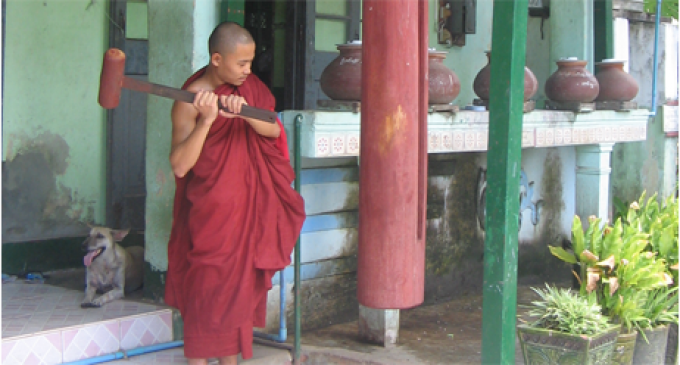KA-LE-DET

“I remember, Morgan, you saying you put up at a phone-gyee-kyaung (Buddhist monastery) in Bagan-Nyaung Oo with your compatriot, Bob, a culture-seeking tourist.”
“Yes, Zilly, we’re there for a fortnight touring around and spending the nights at the phone-gyee-kyaung. Why?”
“Well, I wonder what sort of vicarious thrills you got from Bob’s seeking of Myanmar culture there.”
“Plenty, and all interesting. When he first suggested that we spend the nights at a phone-gyee kyaung during our tour there, saying it’s far better than a hotel, motel or an inn, I thought he’s going to be a penny-pinching bastard but no. He’s right!”
“Hm . . . hm”
“The phone-gyee-kyaung’s a fairly large structure, and I later found out that it accommodates over 30 inmates, including the Sayadaw—that’s the presiding monk—twenty-plus monks of varying ages and monkhood seniority, a handful of novices and a middle aged lay attendant—sort of secretary or something to the Sayadaw.”
“That layman’s called Kuppiya, Morgan. He’s there to do things improper for monks or against their religious code of conduct to do.”
“Yea. No wonder when I offered a greenback—or should I say ‘donated’—to the Sayadaw—as parting gift or donation, he let the layman attendant receive it from me.
“The layman holds the key to the monastery’s store-room. In fact, Kuppiya is a general factotum in a monastery”.
“Quite so, Zilly. When the first evening at the monastery, I felt the need to answer an urgent call of nature, Bob my culture-seeking tourist friend was engaged in a talk with the Sayadaw who, by the way, speaks some English he picked up while studying in Sri Lanka. So I left them discreetly, and seeing the lay attendant outside, I told him my urgent business by sign language. He understood readily, smiled, took me some way inside, then pointing to a room, said, “Coody” or “Goody” something”.
“That’s Koo-di-gunn, water-closet for Buddhist monks, Morgan”
“Yes, Zilly, and it was quite a revelation to me, man!”
“What?”
“Well, Zillion, when we come right down to it, everyone—layman, monk or clergyman or an animal for that matter defecates, but the koo-di-what-do-you-call-it I went into was unusually clean—as clean as a bedroom. There’s an opening somewhere on the floor through which your body waste would drop into the ditch fifteen or twenty feet down below—that’s the floor height of the monastery. And nearby in the room, there’s an earthern pot of water with a cup in it. And a wooden box with a lid on. Opening it, I found a dozen or so bamboo slats of eight or nine inch length. The slats’re so cleanly, smoothly and nicely sliced that I thought they were meant for cleaning their teeth or something until Bob—”
“That’s Ka-nu-dan, Morgan, they’re toilet phone-gyees use”
“Yes, that’s exactly what Bob said—”
“For cleaning their teeth, they use da-bu, twig frayed at the end like a toothbrush”
“That’s what Bob said too. Admirable—how the Buddhist clergy keep their bodies cleansed!”
“That’s not surprising, Morgan, when you remember the be-all and end-all of their existence is to keep both their minds and bodies cleansed of all sins for nirvana.”
“Zilly—”
“Yes, Morgan—.”
“What exactly does that term . . . er . . . nir-what-you-call-it mean, Zilly?”
“Nirvana? Defining nirvana is a herculean task—even scriptures say so. But for us ordinary folks, ‘emancipation’ from Samsara will do. But what’s samsara? It’s the cycle of rebirths every kind of beings on the 31 planes of existence has to undergo and endure. And—.”
“Beings? Planes of existence? What mumbo-jumbo, I can’t understand them at all!”
“Beings include human beings, animals, denizens of hell and perdition, ghosts, ghouls and goblins, celestial beings—all inhabiting the 31 planes of existance. And don’t ask me where these planes are, Morgan, I really don’t know.”
“Meaning—a being born on one of the 31 planes of existence will, once born, go through aging, infirmity and death—only to be reborn again either on the same plane or one of the other 36 planes of existence, and go through the same process of birth, old age, infirmity and death, is that it Zilly?”
“Yes. Until the said being in question attains nirvana, that is, is emancipated from samsara—the cycle of rebirths. from this, you can see how tough the doctrine is both for the Buddhist laity to learn and for the Buddhist monks to teach.”
“Yes, I realised something like that especially for the Buddhist monks while I spent several nights in the phone-gyee-kyaung.”
“How Morgan?”
“Well, I’ll begin from the beginning. The very first night there, I lay awake till midnight what with sleeping in a strange place and what with a drone coming from somewhere in the place. And the drone went on and on until almost midnight. It so got on my nerve that I asked Bob what it’s all about. ‘Incantation or what ?’ I queried. Bob said, no. It’s Buddhist scriptures learning session by junior monks under the tutelage of a senior monk.”
“Yes, Morgan, some phone-gyee-kyaungs, especially bigger ones, double as Buddhist seminaries, where Buddhist scriptures are taught to junior monks called sar-tet kodaws by a senior monk known as sar-chya-kodow.”
“So Bob said. But when I remarked that that’s a tough regimen for the Buddhist clergy with only one meal under their belt he laughed and asked what made me say that. I told him the Buddhist clergy were supposed to go without meal or snack once the noon bell’s struck and he said that’s where I was wrong, the Buddhist clergy have two square meals—and snack—every day before noon. Is that true, Zilly?”
“Yes, true, Morgan. They normally have two square meals before noon. The first meal’s eaten at dawn, called Ar-yone Soon, and the second—anytime before noon.”
“I see. But they have to go round village or town to accept offerings of food, don’t they, Zilly? I often see them going their rounds in the mornings in the broad daylight but never see them do their rounds at dawn.”
“But they do, Morgan”
“Would the Buddhist laity get up and do the cooking that early in the day for their offerings?”
“Most of them do. If they forget to get up early or oversleep, there are always two things to prompt them”
“What are they, Zilly?”
“One is what might be called, “Bon-tau religious rousers”, and the other—call it “religious reveille.” The first is a group of young men going round village or town before dawn calling all pious and religious people to rise up and cook their offering for the clergy, ending with the Pali word Bon-tau. The second— “religious reveille” is nothing but the sound of Ka-le-det.”
“What’s Ka-le-det, Zilly?”
“Well, it’s a hollowed log, kept in Phone-gyee-kyaung and struck at intervals to indicate time for meals, devotions and so on.”
“How does it sound, Zilly?”
“Aw . . . dunno. Why not rise from sleep before dawn yourself, Morgan, and listen to the sound of Ka-le-det?”
Intrigued by my last remark, Morgan rose before dawn the next morning at the phone-gyee-kyaung, awaited the sound of the Ka-le-det, which rang out loud and clear shattering the quiet of the early moning.
Det-det-det-det-det-det-det-det . . .det . . . det . . . det . . . det . . .det.
Zillion
./wp-content/uploads/2018/10/Emirate-Online-TDY.png)


















There are no comments at the moment, do you want to add one?
Write a comment